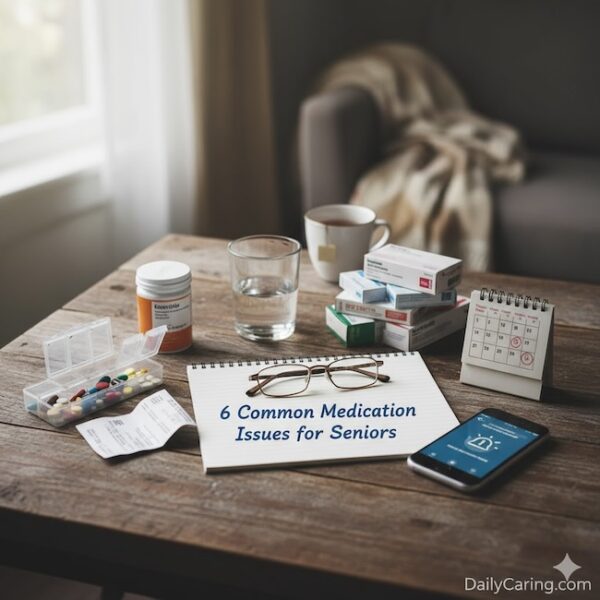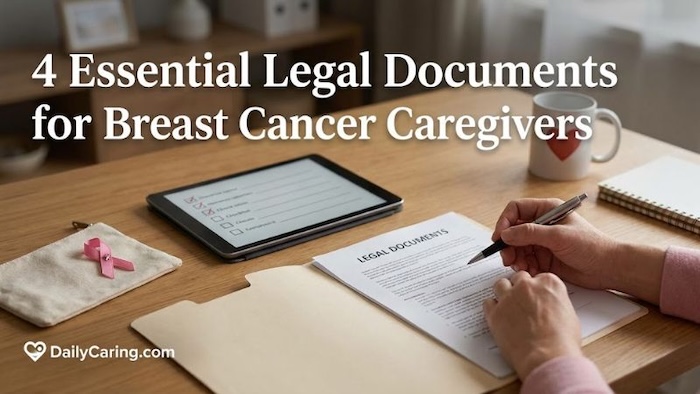For many aging adults, managing multiple medications can feel like a high-stakes puzzle where the pieces are constantly changing. A missed dose here, a dangerous interaction there; these common medication problems can quietly undermine their health, leading to hospital visits, accelerated decline, and immense stress for everyone involved.
The good news is that you don't need a medical degree to become a vital part of the solution. By learning to recognize these six frequent challenges, you can transform from a worried observer into a confident, proactive advocate, ensuring the medications meant to help don't inadvertently cause harm.

Medications have the Potential to Help or Harm
For most older adults, taking medication is essential for managing severe health conditions and improving quality of life.
But it's essential to be aware that medications can also cause harm, especially for seniors.
Are you confident that all the medications your older adult is taking are necessary for maintaining or improving their health?
Do you know if any drugs are causing or worsening specific symptoms?
Dr. Leslie Kernisan, an experienced geriatrician, discusses the top issues about how medication can affect older adults.
In her full article, Dr. Kernisan explains six common medication problems in seniors and six ways to minimize the difficulties drugs can cause.
We summarized the key points from her article and shared additional tips and perspectives.
6 Common Medication Problems in Seniors
1. Side effects that worsen thinking and balance
Many common medications cause side effects that affect thinking and balance.
These include:
- Anticholinergics – a class of drugs that are widely used for conditions like overactive bladder, trouble sleeping, itching, allergy, nausea, nerve pain, depression, and more
- Sedatives/tranquilizers – usually prescribed for sleep issues or anxiety
- Medications that affect memory, increase fall risk, or cause confusion
2. Symptoms that don’t improve
Sometimes symptoms don’t get better even after starting a new medication.
When doctors start an older adult on a drug to treat a particular health condition, they’ll choose a specific dose.
But they typically don’t follow up to determine whether adjustments are needed to treat the symptoms correctly.
When this happens, older adults end up taking medications that aren’t working and that could interact with other drugs.
And, they’re spending money on the meds, but aren’t getting any benefit.
3. Drug interactions
When multiple drugs, vitamins, or supplements are taken, they can interact with each other and cause problems.
For example, warfarin is a commonly used blood thinner that can interact with antibiotics as well as with other drugs.
4. Drugs having a more substantial effect than intended
Older bodies process medications differently from younger bodies do. As a result, a drug may have a more significant impact than expected.
For example, a blood pressure medication could lower blood pressure more than it should, causing dizziness or lightheadedness that increases fall risk.
Similarly, a diabetes drug could end up lowering blood sugar too much, causing falls or faster cognitive decline.
5. Difficulty scheduling and taking medications
On average, people over 65 take 14 – 18 prescription medications a year. That’s a lot to manage, especially when drugs need to be taken at different times of day.
Getting medications mixed up, missing doses, or taking too much or too little of a drug can cause serious health issues.
6. High cost of medications
Prescription drugs are expensive, even with coverage from Medicare Part D plans.
If an older adult doesn’t have the budget to cover the medications they need, they may skip doses or go without filling prescriptions.
6 Strategies to Minimize Medication Challenges in Aging Adults
1. Check the Beers List
The Beers List for Potentially Inappropriate Medication Use in Older Adults is a list of medications that are more likely to cause problems for seniors because older bodies process drugs differently.
The Beers List helps doctors recognize potential side effects, enabling them to exercise greater caution when prescribing drugs to older patients.
Check your older adult’s medications to see if any are on the Beers List. But DON'T make any changes if you see that your older adult is taking something on the list – that’s very dangerous, and there could be a good reason the doctor chose that specific medication.
It is recommended that you contact your doctor to discuss the pros and cons of the medication, whether the dose is appropriate, and any potential side effects or interactions to watch for.
Another helpful list from the American Geriatrics Society covers 10 medications that seniors should avoid or use with caution.
A pharmacist can also help spot potential risks with your older adult’s medications.
2. Make a complete list of all medications
Keep a full list of all drugs that your older adult is taking.
That includes prescription, over-the-counter (OTC), and vitamin supplements.
Find out the primary reason for the medication.
Don’t be afraid to ask the doctor or pharmacist to explain.
Ask the doctor if all of the medications are needed.
They should eliminate or modify anything that isn’t working well or is no longer needed. A drug could have been started and then forgotten about – even though it should have been discontinued long ago.
Consider if the drug is still necessary.
For example, is a painkiller effectively relieving your older adult’s pain? If the doctor hasn’t recently reviewed the symptoms and the drug, be sure to discuss it with them.
Ask the doctor about non-drug alternatives.
For example, drugs for depression or anxiety could be reduced in dosage or eliminated with the help of regular therapy or counseling sessions. Physical therapy or specific exercises could reduce pain and reduce the need for painkillers.
Ask the doctor if a lower dose could do the job.
The risk of side effects and drug interactions increases with higher doses. So, if lower doses could work just as well, they should be considered.
3. Check for drug interactions
Ask the doctor or pharmacist to check the entire list of drugs (including OTC, vitamins, and supplements) for potential interactions.
Or, check the list yourself when you prepare for a discussion with the doctor. Find out how here.
If you discover a potential concern, let the doctor know right away. DON’T stop the medication or change doses on your own – that can be very dangerous.
4. Get help with medication costs
If your older adult’s prescription medications are straining the budget, explore ways to lower costs.
For example, working with the doctor to identify ineffective or unnecessary medications reduces the number of drugs required.
We’ve also got 7 tips to help lower drug costs and 5 options for drugs that aren’t covered by Medicare.
5. Simplify medication schedules
If an older adult’s medication schedule is getting too complex to manage, ask the doctor or pharmacist about options for simplifying their medication needs or routine.
For example, certain medications may no longer be needed and can be safely discontinued.
Or, there might be a once-a-day dose that works just as well as taking the drug 3 times a day.
And, in some cases, perhaps a non-drug alternative could reduce or eliminate the need for a medication.
6. Keep the doctor fully informed and up-to-date
You see your older adult more often and know them and their routine far better than their doctor could.
When your older adult sees any of their doctors, make sure they review the complete list of drugs (including OTC, vitamins, and supplements).
One doctor often won’t be aware of drugs prescribed by another doctor – you might be the only person who has the whole picture.
Also, it’s essential to let the doctor know if your older adult hasn’t been taking certain medications or tends to forget or skip doses.
Final Thoughts About Medication Issues and Aging Adults
Taking charge of your loved one's medication safety is one of the most impactful ways you can protect their health and independence. These six solutions are more than just tips – they're a framework for building a safer, more manageable system.
Remember, your vigilant eye and willingness to ask questions are robust safeguards. Start with one problem that resonates most, and build from there. You are the crucial link between your loved one and their healthcare team, and your advocacy ensures their treatment plan truly supports their well-being.
Your diligence today paves the way for their healthier tomorrow.
Recommended for you:
- Prevent Dangerous Drug Interactions in Seniors with a Drug Interaction Checker
- Medications That Worsen Dementia and Increase Dementia Risk: Anticholinergics
- 10 Tips for Safe Medication Management for Seniors
About the Author

Connie is the founder of DailyCaring.com and was a hands-on caregiver for her grandmother for 20 years. (Grandma made it to 101 years old!) She knows how challenging, overwhelming, and all-consuming caring for an older adult can be. She also understands the importance of support, especially in the form of practical solutions, valuable resources, and self-care tips.














My dad has some age related memory problems, but not dementia. But he lives alone and taking mediation at regular intervals was a problem. He only takes medications twice a day but a couple of the heart medications need to be taken the same time every day and 12 hours apart to be most effective.
When I was there visiting I noticed he’d take them when he walked by or with breakfast and dinner, whenever those meals might be. So we set a schedule (8am and 8pm – none depended on food) and bought a pill reminder alarm. It was great when he was in the room and heard it. But it only sounded once for a minute. Then we found an alarm that goes off every 5 minutes – for a minute at a time – until it is acknowledged.
It has a setting for voice and/or beep. He uses both and talks to the lady when he goes to turn it off “Okay, okay. I hear ya… I’m coming” 🙂 He then goes to take his medication.
Not to recommend any particular brand but this is the one we purchased. It’s more expensive but it is worth it knowing that the medication is being taken correctly. “Talking Pill Reminder Clock with Loud, Easy Set, Multiple Alarms by MedCenter”
Also – this website is a terrific resource for information and coping skills. Thank you!
Thanks for the excellent suggestion and kind feedback! We’re so glad you found a product that solved your dad’s medication challenge.
I got the pill alarm on Amazon – but didn’t know if I could include the link. Here it is… please feel free to edit it into my original post in whatever format is appropriate.
https://www.amazon.com/MEDCENTER-70942-MedCenter-Talking-Alarm/dp/B00CEZQ9U4
Thank you for sharing! It’s very helpful to hear about your and your dad’s personal experience with this pill alarm.